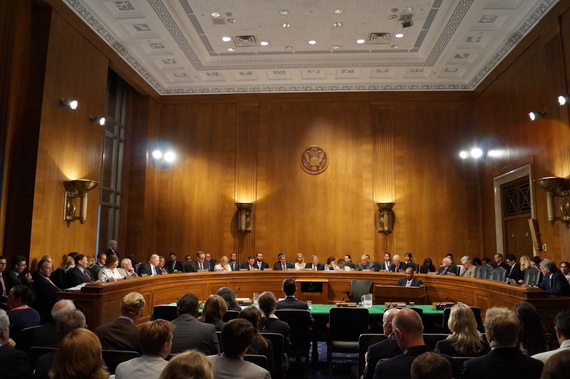In recent years, commercial and population centers in the U.S. have experienced record and sustained droughts. Such water scarcity imperils the health of Americans and the economic and environmental security of our country. California, with its unprecedented water restrictions and raging wildfires, is the best-known example, but far from the only state to have had its lifestyle disrupted by water scarcity. And the future doesn't augur well: As many as 40 of our 50 states are projected by the U.S. Government to have water supply concerns by 2025 and already nearly one-third of the country's land mass is facing water scarcity challenges.
This situation resembles water crises that Israel faced in its past. Recognizing that it could not grow into a vibrant, secure state in the face of perpetual drought, Israel invested in an array of technologies and infrastructure to change its destiny. Today, Israel stands water-secure, weather independent, and in fact provides both water and water know-how to its neighbors and to countries around the world.
Last week, the U.S. Congress took a wise and important first step toward leveraging Israel's water expertise. In its consideration of The Water Resources Development Act of 2016 ("WRDA bill"), the Senate Environment and Public Works Committee passed three provisions that would streamline, deepen, and incentivize U.S.-Israel water cooperation, enabling the U.S. to immediately tap into transformative Israeli water technologies.
Incentivized local and private sector water cooperation with Israel
The WRDA bill creates a powerful new incentive for private companies and local governments to collaborate with Israel in the area of desalination. It does so by creating a new priority, within an existing desalination grant program, for potential grantees who demonstrably leverage the experience of Israel in desalination.
As no country is more advanced in the application of desalination technology than Israel, which now obtains the equivalent of more than 80% of its drinking water from desalination, this Congressional approach makes great sense. An Israeli government agency turned into a private company, IDE Technologies, is the primary contractor of the Carlsbad Desalination Project, which is the largest desalination plant in the Western hemisphere and which recently won the 2016 Global Water Award for Desalination Plant of the Year. While U.S.-Israel desalination cooperation has been productive - as evidenced by Carlsbad - its full potential has not been realized. The WRDA bill could change that.
Enhanced government-to-government water collaboration
Although there is much to be gained from incentivizing private and local sector water collaboration with Israel, the sheer scale of large water projects requires the commitment and attention of the Executive branch of government. The U.S. would, therefore, also benefit from a Presidential-level forum facilitating regular communication with the Israeli government on technology and water scarcity issues. The WRDA bill creates that forum by instructing the White House Office of Science and Technology Policy to develop a coordinated strategic plan that strengthens research and development cooperation with Israel in water technology.
Authorized technology transfers and exchanges with allies
Lastly, the WRDA bill creates an international outreach program which authorizes the U.S. Army Corps of Engineers, in pursuing water development projects throughout the country, to engage in research, development, training, dialogue, and technology transfer with our allies. This policy would not only draw us closer with these countries important to us, it would also ensure that American communities receive the very best the world has to offer when the Army Corps addresses their water challenges. In light of Israel's expertise across the range of water resource technologies, this new program will accrue to the benefit of the U.S.-Israel relationship and provide - at limited cost - the Army Corps with significant new resources with which to address the prevalence of access-to-water- issues across our country.
Since nothing happens by itself, and especially so in Washington, DC, there is praise to go around for the work of the Senate Committee on Environment and Public Works for having identified prudent solutions to pressing water scarcity problems. This has been a bipartisan effort. Republican Committee Chairman James Inhofe and Democratic Ranking Member Barbara Boxer, in particular, have shown great vision in developing new and creative paths forward to increase our growing country's water supply. For our sake, the full Senate and the House should be encouraged to pass these provisions as part of the WRDA bill.
Seth M. Siegel is a businessman, activist and writer. His new book Let There Be Water: Israel's Solution for a Water-Starved World is a New York Times bestseller. Seth regularly appears on television and radio, and his essays have appeared in The New York Times, The Wall Street Journal, and the Los Angeles Times. He is a member of the Council on Foreign Relations. Learn more about Let There Be Water at www.lettherebewater.com and follow Seth @SethMSiegel.
